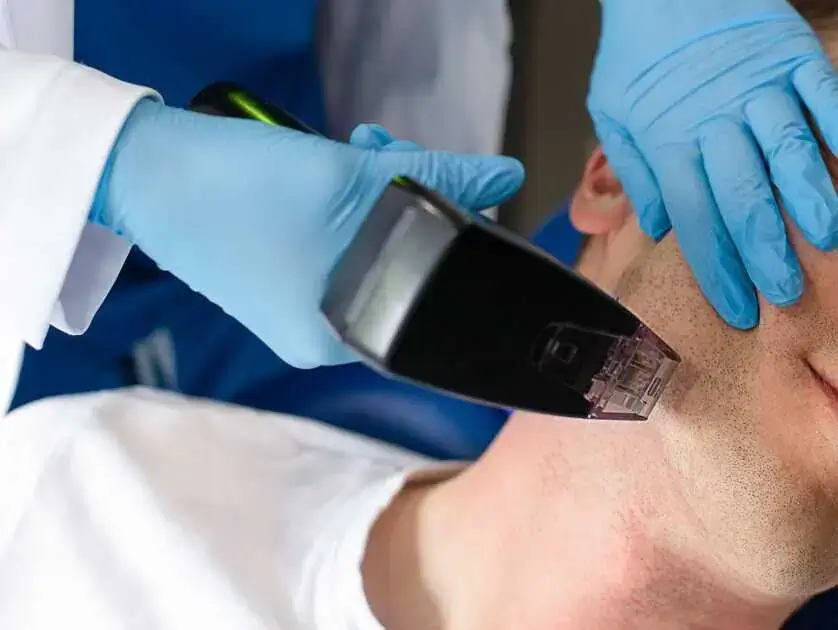Table of Contents
Peptide therapy is on the rise, hailed for its promise in areas ranging from muscle repair to anti-aging. But as with any medical treatment, it’s crucial to ask: What’s the catch? This question leads us to the heart of today’s discussion – the side effects of peptide therapy. While many report significant health benefits, the conversation wouldn’t be complete without a candid look at the potential drawbacks. With peptides like CJC-1295 and Ipamorelin at the forefront of this therapy, understanding their impact is critical. So, let’s peel back the layers, starting with what these treatments involve and then inching closer to the question on everyone’s mind: Are there side effects we should be aware of?
What is Peptide Therapy?
Peptide therapy might sound complex, but at its core, it’s a treatment that utilizes peptides—short chains of amino acids, which are the building blocks of proteins in our body to achieve various health goals. Unlike traditional medications that might be synthetic or based on larger protein structures, peptides are smaller and can be designed to mimic natural substances in our bodies. It allows them to slide into our biological processes more seamlessly, sending signals to cells to regulate and rejuvenate functions that might be waning due to age or illness.
For instance, they can encourage the body to produce more growth hormones, which is why they’re often spotlighted in anti-aging. But their use is not limited to just that; peptides have a wide range of applications, from muscle repair after an injury to aiding in weight loss. They are typically administered through injections, which ensures that they are directly absorbed into the bloodstream and can begin their work without being broken down by the digestive system first.
Different Types of Peptides
Peptide therapy utilizes a variety of peptides, each with distinct properties and potential health benefits:
- CJC-1295: This peptide hormone acts as a growth hormone-releasing hormone (GHRH) analog, promoting HGH secretion and protein synthesis, which can lead to growth and fat loss.
- Ipamorelin: Composed of five amino acids, Ipamorelin stimulates the pituitary gland to increase natural growth hormone production, benefiting various biological processes without substantially affecting cortisol and prolactin levels.
- Sermorelin: A diagnostic agent that assesses growth hormone secretion to diagnose growth hormone deficiency, Sermorelin is a functional fragment of GHRH.
- Thymosin Beta-4 (TB-500): A cell-building protein that assists in the repair of joints, tissues, muscles, and ligaments, TB-500 also has anti-inflammatory and microbial growth reduction properties
- KPV: A peptide with anti-inflammatory and anti-microbial benefits, KPV promotes gut health and aids in the healing of wounds, with implications for treating inflammatory disorders.
- PE-22-28: Derived from Spain, this peptide is being researched for its potential as an antidepressant, promoting neuron growth and aiding in stroke recovery.
Each peptide is targeted for specific therapeutic outcomes, making them integral components of peptide therapy’s tailored approach to health and well-being.
Benefits of Peptide Therapy
Peptide therapy offers a spectrum of potential benefits which have attracted attention in the medical community. Here’s a comprehensive look at the reported advantages:
- Enhanced Growth Hormone Production: Peptides can stimulate the body’s natural growth hormone release, which has implications for muscle growth, repair, and metabolism.
- Anti-aging: By promoting cell regeneration, peptides may improve skin elasticity and reduce the appearance of aging.
- Weight Management: Certain peptides are believed to assist in burning fat, helping in weight loss efforts.
- Improved Muscle Recovery: They may speed up the healing process after muscle strain or injury, making them popular among athletes.
- Increased Bone Density: There’s potential for peptides to aid in bone healing and growth, which is crucial as one ages.
- Strengthened Immune System: Some peptides have immunomodulatory effects that can bolster the body’s defense mechanisms.
- Better Sleep Quality: By regulating the release of growth hormones, some peptides may improve sleep patterns and quality.
- Libido Enhancement: Certain peptides have been associated with increased sexual drive.
- Mood and Cognitive Function: They positively affect mood and cognitive function due to their influence on growth hormone levels and neuroprotection.
Known Side Effects of Peptide Therapy
The side effects of peptide therapy can range from mild to severe and may differ depending on the specific peptide used. Common side effects across most injected peptide therapies include:
- Swelling: Particularly in the lower legs or hands, known as peripheral edema.
- Injection Site Reactions: Pain, swelling, redness, and itching at the injection site.
Serious side effects that require immediate medical attention include:
- Allergic Reactions: Manifested as skin rash, itching, hives, or swelling of the face, throat, lips, or tongue.
- Respiratory Issues: Such as trouble breathing and chest pain.
- Cardiovascular Symptoms: Including sweating or feeling lightheaded.
These side effects are important considerations when evaluating the suitability of peptide therapy for an individual.
Patient Considerations and Safety
When it comes to peptide therapy, patient safety and appropriate considerations are paramount. Here are some key points to keep in mind:
- Medical Supervision: Peptide therapy should only be initiated under the guidance of a healthcare professional who can monitor progress and side effects.
- Individual Health Status: Patients must be evaluated for their health needs and conditions before starting treatment.
- Awareness of Side Effects: Patients should be informed of the potential side effects and what to monitor for signs of adverse reactions.
- Allergy Testing: Patients may require allergy testing before therapy to ensure they won’t have allergic reactions to the peptides.
- Regulatory Compliance: It’s essential to use approved or compliant peptides with regulatory standards to ensure quality and safety.
These considerations are crucial to ensuring that peptide therapy is safe and effective for patients. It’s always advised to have a detailed consultation with a healthcare provider to discuss these factors concerning individual health needs and goals.
Takeaway
If you’re considering peptide therapy and want to explore your options with a trusted provider, contact Gentle Giant Care. Our team is dedicated to guiding you through the process, ensuring your therapy is tailored to your health goals. With expertise in peptide treatments, they prioritize your well-being and safety. Connect with Gentle Giant Care today to schedule an assessment and take the first step towards a healthier you.





